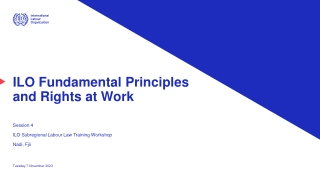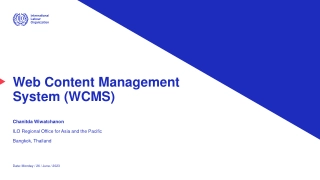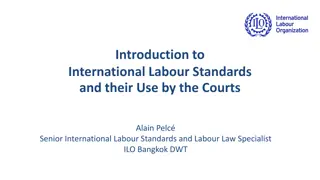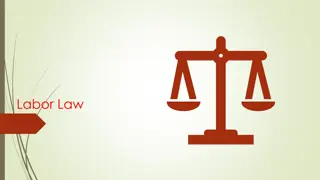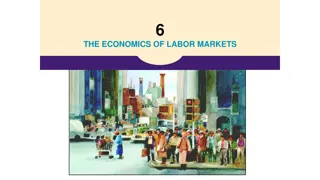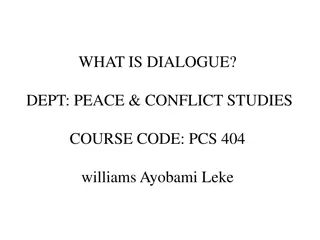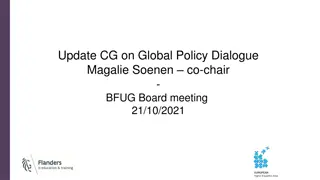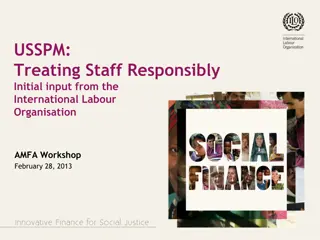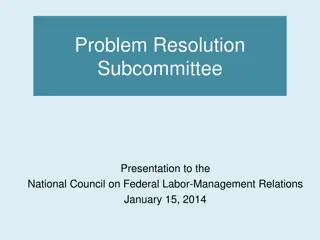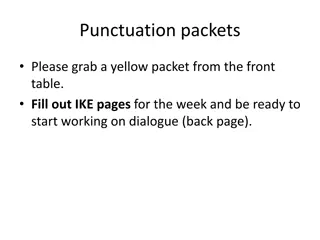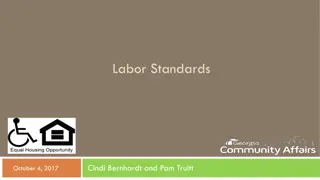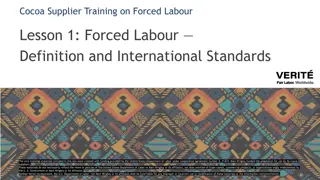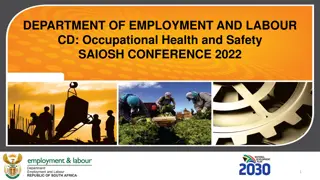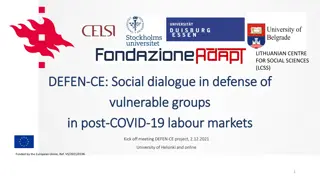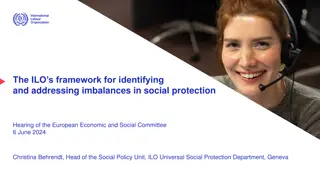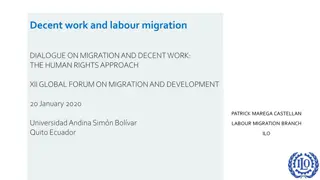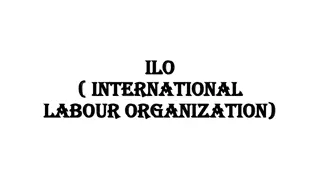ILO and Social Dialogue in Global Labor Standards
The content discusses the International Labor Organization (ILO) and its role in promoting global labor standards through social dialogue. It covers key conventions and guidelines established by the ILO to ensure fair labor practices worldwide, including conventions on freedom of association, forced labor, child labor, and more. The visuals depict various aspects of ILO's work and global labor statistics as of April 2013.
Download Presentation

Please find below an Image/Link to download the presentation.
The content on the website is provided AS IS for your information and personal use only. It may not be sold, licensed, or shared on other websites without obtaining consent from the author.If you encounter any issues during the download, it is possible that the publisher has removed the file from their server.
You are allowed to download the files provided on this website for personal or commercial use, subject to the condition that they are used lawfully. All files are the property of their respective owners.
The content on the website is provided AS IS for your information and personal use only. It may not be sold, licensed, or shared on other websites without obtaining consent from the author.
E N D
Presentation Transcript
IndustriALL/FNV/LO-TCO Asia MNCs & Social Dialogue Yoon Hyowon industriallyoon@gmail.com 1
? ILO , , 2
ILO Core Labour Standards OECD Guidelines for MNCs UN Global Compact Global Agreement with MNCs File:ISO english logo.svg ISO 26000 4
ILO 5
ILO? International Labor Organization UN 1919 3 , , 185 6 ILO International Conference 6
ILO Conventions: legally binding international treaties ratified by member countries Recommendations: non-binding guidelines 189 201 www.ilo.org 7
ILO ILO . 24 : , , , , , 3 , , , , , , , , , , , 8
(as of 2013 April) India: 43 (4) Indonesia: 18 (8) Malaysia: 16 (6) Thailand: 15 (5) Vietnam: 19 (5) Cambodia 13 (8) Korea: 28 (4) China: 25 (4) Japan: 48 (6) Saudi Arabia: 15 (5) Iraq: 66 (7) Iran: 13 (5) Lebanon: 51 (7) Myanmar: 21 (2) Philippines: 37 (8) Singapore: 27 (6) Sri Lanka: 40 (8) Brazil: 96 (7) Canada: 34 (6) Chile: 61 (8) Denmark: 72 (8) France: 124 (8) Germany: 83 (8) Italy: 111 (8) Jordan: 24 (7) Mexico: 78 (6) Netherlands: 106 (8) New Zealand: 60 (6) Norway: 107 (8) Russia: 69 (8) South Africa: 23 (8) Spain: 133 (8) Sweden: 93 (8) Switzerland: 58 (8) Turkey: 56 (8) UK: 86 (8) USA: 14 (2) 9
ILO ( ) 4 8 10
ILO Fundamental Conventions 1. Freedom of Association and Protection of the Right to Organize Convention, 1948 (No. 87) 2. Right to Organize and Collective Bargaining Convention, 1949 (No. 98) 3. Forced Labor Convention, 1930 (No. 29) 4. Abolition of Forced Labor Convention, 1957 (No. 105) 5. Minimum Age Convention, 1973 (No. 138) 6. Worst Forms of Child Labor Convention, 1999 (No. 182) 7. Equal Pay Convention, 1951 (No. 100) 8. Discrimination (Employment and Occupation) Convention, 1958 (No. 111) 11
ILO Core Labor Standards 4 freedom of association & right to collective bargaining (C87, C98) No forced labor(C29, C105) No child labor(C138, 182) No discrimination (C100, C111) 12
Freedom of Association Workers have the freedom and right to organize their own organizations or join trade unions to represent their interests and defend their rights. Employers or government can not interfere with union organizing or union activities. 13
Freedom of Association Workers have the freedom and right to Umbrella workers organization like regional/national unions and industrial/national federation can directly engage in supporting workers and organizing unions. 14
The Right to Collective Bargaining Collective bargaining is a negotiation between management and union to jointly decide wage, working conditions, social or economical environment which influence the livelihood of workers or their families . 15
The Right to Collective Bargaining The final result of collective bargaining is to make a collective agreement (CBA) . The CBA can be made at local, regional, industrial and national levels. 16
No Child Labor Minor work should not be allowed to those under 13- years old. Normal work should not be allowed to those under 15- years old. Dangerous work should not be allowed to those under 18-years old. 17
Forced Labor Doing work by threat and enforcement, without my agreement or approval Overtime without dialogue with workers or unions 18
No Discrimination Equal pay for equal work, equal treatment for equal work Discrimination between men and women Discrimination between regular and non-regular workers What kind of discrimination do we experience in our workplace? 19
Ratification by Country Conv. 87 Conv. 98 Conv. 29 Conv. 105 Conv. 138 Conv. 182 Conv. 100 Conv. 111 Country No No 1954 2000 No No 1958 1960 India 1998 1957 1950 1999 1958 1999 1999 2000 Indonesia 1961 1957 No 1997 1997 2000 Malaysia No No No 1969 1969 2004 1999 No Thailand No 2001 No 2007 No 2003 1997 1997 Vietnam No 2000 Korea 1999 2001 1997 1998 No No No No 20
OECD Guidelines for Multinational Enterprises 21
OECD? Organization for Economic Organization for Economic Cooperation & Development Cooperation & Development 1948 34 Australia, Austria, Belgium, Canada, Chile, Czech Republic, Denmark, Estonia, Finland, France, Ger many, Greece, Hungary, Iceland, Ireland, Israel, It aly, Japan, Korea, Luxembourg, Mexico, Netherla nds, New Zealand, Norway, Poland, Portugal, Slo vak Republic, Slovenia, Spain, Sweden, Switzerla nd, Turkey, United Kingdom, US www.oecd.org 22
OECD Guidelines for MNCs International standard for good corporate conduct 1976 , 2000 2011 . , , . Not legally binding, but voluntary guidelines (recommendation) National Contact Point (NCP) suppliers and subcontractors to apply the Guidelines 23
OECD Guidelines for MNCs 1 11 1. Concept and principles, 2. General Policies, 3. Information Disclosure, 4. Human Rights, 5. Employment and Industrial Relations, 6. Environment, 7. Combating Bribery, 8. Consumer Interests, 9. Science & Technology, 10. Competition, 11. Taxation 24
OECD Guidelines for MNCs 3 . Timely and accurate information is disclosed on activities, structure, financial situation, performance, ownership and governance , shareholders and voting rights, etc. Financial and operating results of the company Information on board members (qualification and selection process) and key executives, and their remuneration (pay) Information and issues on workers and stakeholders Information on subcontractors and suppliers Governance structure and policies Information on internal audit (financial statements) 25
OECD Guidelines for MNCs 4 . MNC must respect human rights MNC must prevent or mitigate adverse human rights impacts that are directly linked to its business operations, products or services. The International Bill of Human Rights, consisting of the Universal Declaration of Human Rights The International Covenant on Civil and Political Rights The International Covenant on Economic, Social and Cultural Rights The ILO Declaration on Fundamental Principles and Rights at Work What is the key part of human rights? 29
OECD Guidelines for MNCs 5 . 30
OECD Guidelines for MNCs 5 . Provide facilities to workers representatives for effective collective agreements Provide information needed for meaningful negotiations Promote consultation and cooperation on matters of mutual concern Provide the best possible wages, benefits and conditions of work, which is adequate to satisfy the basic needs of the workers and their families Take adequate steps to ensure health & safety at work Provide job training to improve skill levels Provide reasonable notice in case of change of employment effects such as collective lay-offs or dismissals, and meaningful cooperation to mitigate the effects of such decisions Do not threaten to transfer the whole or part of plant to other country in order to unfairly influence negotiations and hinder the exercise of a right to organize Allow workers representatives to consult with management representatives who are authorized to take decisions in collective bargaining and labor relations 31
OECD Guidelines for MNCs National Contact Point (NCP). NCP raise the issue or case. NCP OECD . 32
UN Global Compact Kofi Annan 1999 World Economic Forum 2000 7 . Corporate Social Responsibility (CSR) 145 1 , 7 4 10 www.unglobalcompact.org 34
UN Global Compact Human Rights 1. MNC support human rights 2. MNC do not abuse human right Labor Standards 3. MNC respect the freedom of association and the right to collective bargaining 4. Elimination of forced labor 5. Abolition of child labor 6. Elimination of discrimination at work Environment 7. MNC support precautionary approach to environment 8. Promote greater environmental responsibility 9. Develop environmentally friendly technology Anti-Corruption 10. MNC should work against all forms of corruption 35
Freedom of Association & Collective Bargaining Ensure that all workers are able to form and join a trade union of their choice without fear of intimidation or reprisal, in accordance with national law. Put in place non-discriminatory policies and procedures with respect to trade union organization, union membership and activity in such areas as applications for employment and decisions on advancement, dismissal or transfer. Do not interfere with the activities of worker representatives while they carry out their functions in ways that are not disruptive to regular company operations. Allow the collection of union dues on company premises, posting of trade union notices, distribution of union documents, and provision of office space. Provide workers representatives with appropriate facilities to assist in the development of effective collective agreement. 36
Freedom of Association & Collective Bargaining Recognize trade union for the purpose of collective bargaining. Use collective bargaining as a constructive forum for addressing working conditions and terms of employment and relations between employers and workers. Address any problem-solving or other needs of interest to workers and management, including restructuring and training, redundancy procedures, safety and health issues, grievance and dispute settlement procedures, disciplinary rules, and family and community welfare. Provide information needed for meaningful bargaining. Balance dealings with the most representative trade union to ensure the viability of smaller organizations to continue to represent their members Inform the local community, media and public authorities of your company's endorsement of the UN Global Compact and its intention to respect its provisions, including those on fundamental workers' rights. 37
No Force Labour Situations of forced labour are generally characterized by a lack of consent to work. Exploitative practices such as forced overtime Physical or psychological (including sexual) violence as a means of keeping someone in forced labour (as a threat against worker, family, or close associates) Deception or false promises about terms and types of work Slavery, Bonded labour or debt bondage, Physical abduction or kidnapping, Sale of a person into the ownership of another, Physical confinement in the work location (in prison or in private detention), The work or service of prisoners, Work required to punish opinion or expression of views ideologically opposed to the established political, social or economic system, The lodging of deposits (financial or personal documents) for employment, Full or partial restrictions on freedom of movement, Withholding and non-payment of wages (linked to manipulated debt payments, exploitation, and other forms of extortion), Deprivation of food, shelter or other necessities 38
No Child Labour the term "child" covers all girls and boys under 18 years of age. Developed countries Light Work 13 Years Regular Work 15 Years Hazardous Work 18 Developing countries Light Work 12 Years Regular Work 14 Years Years Hazardous Work 18 Years Exercise influence on subcontractors, suppliers and other business affiliates to combat child labour. 39
No Discrimination Equal treatment for equal work Equal treatment in terms of Recruitment, Remuneration, Hours of work and rest/ Paid holidays, Maternity protection, Security of tenure, Job assignments, Performance assessment and advancement, Training and opportunities, Job prospects, Social security, Occupational safety and health 40
Global Framework Agreement . Code of Conduct Danone-IUF 1988 21 43
IndustriALL Aker, AngloGold, BMW, Bosch, Brunel, Daiml er, EADS, EDF,Electrolux, Endesa, Enel, Eni, E vonik, Ford, Freudenberg, GDF Suez, GEA, Indesit, Inditex, Lafarge, Leoni, L ukoil, MAN, Mann + Hummel, Mizuno, Norsk Hydro, Norske Skog, Petrobras, Prym,PSA Peugeot Citro n, Renault, Rheinmetall, Rhodia, R chli ng,Saab, SCA, Siemens, SKF, Statoil, Umicore , Vallourec,Volkswagen, ZF 44
IndustriALL-Lafarge Abolition of forced labor No discrimination at workplace Elimination of child labor Right to organizing trade union and collective bargaining Guarantee living wage Improve health, safety and working conditions Provide Job training 45
IndustriALL- Freudenberg No forced labor and child labor Equal opportunities and equal treatment on the job Freedom of association and the respect for basic trade union rights Right to organizing trade union and collective bargaining No discrimination against trade union representatives Health & safety at workplace Flexible, efficient and customer-oriented forms of work organization 46
Norske Skog-IndustriALL Freedom of association & collective bargaining No discrimination and equal opportunity Health and safety at workplace No forced labor No child labor Wages & benefits covering basic needs of the workers and their family Employment status for workers based on permanent job Irregular workers like temporary/part-time workers must receive the same terms conditions with comparable regular workers. 47
File:ISO english logo.svg ISO 26000 ISO
ISO? International Organization for Standardization ( ) 1947 , 161
ISO member countries India: India: Bureau of Indian Standards (BIS) www.bis.org.in Indonesia: Indonesia: Badan Standardisasi Nasional (BSN) www.bsn.go.id Malaysia: Malaysia: Department of Standards Malaysia (DSM) www.standardsmalaysia.gov.my Thailand: Thailand: Thai Industrial Standards Institute (TISI) www.tisi.go.th/ Vietnam: Vietnam: Directorate for Standards, Metrology and Quality (STAMEQ) www.tcvn.gov.vn Korea: Korea: Korean Agency for Technology and Standards (KATS) www.kats.go.kr


